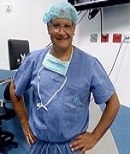Day 1 :
Keynote Forum
Dr.Jorge Eduardo Guzmán Prenk
Bogotá, Colombia
Keynote: Comparison between the use of the surgical paddle and percutaneous leads in SCS treatment for chronic pain
Time : 11:00-12:00 pm

Biography:
The University of Pittsburgh Medical Center and Presbiterean Hospital where he studied neuropathology. And in Bogotá he got the chance to work at Hospital San Juan de Dios (a trauma center), Hospital Clínica Del Niño, Fundación Santafé De Bogotá amongst others Universidad Nacional De Colombia 1987 1993 he studied medicine at the top school of medicine in the country. This experience gave him the opportunity to learn and practice medicine fron the widest point of view possible. There he develope his love and passion for neurosciences
Abstract:
The use of paddle leads implanted through a surgical procedure initially shows slightly higher postoperative complications on one hand but on the other, they have significantly lower long-term reoperation rates. Also, it has been shown that the long-term healthcare costs are similar between the paddle and percutaneous leads. The upcoming improvements in SCS technologies including those in current systems help reduce the risk of reoperation due to hardware failure. Further study is required to evaluate the efficacy of newer percutaneous and paddle SCS systems and examine their comparative outcomes. Never the less it still seems better to use surgical paddle leads over percutaneous leads.
Keynote Forum
Dr.Rosanna Chifari
Scientific director of Ippoocrateorg.org
Keynote: neurological effects of Long therapy: ivermectin as effective therapy.
Time : 5:00-6:00 pm

Biography:
Graduated cum laude in 1995, she completed her PhD (post-doc) in Neurology at the University of Strasbourg (France) in 1999 with a study on epileptic absences with automatisms, under the guidance of Prof. C. Marescaux. At the same time she managed a clinic for patients with drug resistant epilepsy, dealing with the presurgical study of patients with epilepsy.
Dr. Chifari won a research grant from the University of Milan in 2002-2005 for the project: "Individuation of drug - resistance criteria an molecular markers of epieptotogenicity in TS patients".
Abstract:
Increasing report of persistent and disabling symptoms after recovery from acute COVID -19 have been reported and that have termed as “ Long COVID “ and it occur in 10% to 30% of cases .
On neurological point of view patients describe memory impairment abs concentration , described as “ brain fog “ and is highly suggestive of chronic fatigue syndrome. Although a specific treatment is not yet validated to treat Long COVID syndrome , we reported our experience with ivermectin in such patients.
We treated 50 patients with 0,2 mg /kg to 0,4 mg/kg for 3 to 7 days according symptomatic expression ( mild to moderate ). We found a resolution in 85% of the patients treated with Ivermectin.
Our experience suggest that ivermectin could be a gold standard treatment in long COVID neurological symptoms .
Further studies are needed to confirm this data
Keynote Forum
Dr.Michele Conti
Neurosurgeon, Italy
Keynote: THE LUMBAR ANTERIOR LIGAMENT AND HIS ROLE IN INTERBODY FUSION WITH THE CAGES: Cadaveric anatomic study
Time : 3:00-4:00 pm

Biography:
He graduated in Medicine and Surgery in 1996 at the University of Verona and he got the Specialization in Neurosurgery in 2001 with full marks (50/50) at the same site with Prof. Bricolo, doing an anatomical thesis on cadaver on the vascularization of cranial nerves in the cavernous sinus.Between 1996 and 2001 he has been a Neurosurgery Resident in the Department of Verona.(chief resident in the years 1999-2000)From October 2001 to April 2010 he worked at the Neurosurgery of St. Maurice Hospital in Bolzano, as Medical Director.
In 2020 co-founder of Get Well Spine Center (Rovereto) and beginning of surgical activity at City Clinic (Bolzano).
Abstract:
In the last 25 years, the spine surgery is changed, in the past the spine surgeons treated only the discus hernia and vertebral stenosis with the microdiscectomy in according with Caspar technique and with laminectomy. The fusion technique has been used only for scoliosis deformity and for spine injury. The results of the degenerative pathology were not satisfactory and improved with the vertebral fixation with different technique, above all the posterior arthrodesis with pedicle screws and rods 1 The complication of this technique was the degeneration to the upper discus 2 , for this reason improve the technique to replace the discus with cages and obtain an interbody fusion and restore the right sagittal balance with the physiological lordosis. The aim of this study is to describe the surgical anatomy of the lumbar anterior ligament to reach the best placement in the intersomatic space of the expansion cages to reduce the stress on the vertebral bone plates and minimize the risk of subsidence..
Keynote Forum
Dr Melchor Rodrigo
Professor of Neurology, Buenos Aires, Argentina
Keynote: The underdiagnosis of cryoglobulinemias, a potentially big problem at the long term
Time : 10:00-11:00 am

Biography:
Melchor Rodrigo was born in Alexandria (Virginia, United States) in 1978. At the age of four, he traveled to Argentina, the place of origin of his parents. Since then, she has lived in both countries because of the flexibility her father's job required. After graduating as a doctor from the University of Salvador, he returned to his native country where he did research in Neuroradiology and General Radiology. With less than a year of receipt, he published papers in the World Federation of Neurosurgery. Later, in prestigious publications such as the Cardiovascular and Interventional Radiological Society of Europe and the Association of University Radiologists.
Abstract:
Purpose: To evaluate the prevalence of cryoglobulinemias, as well as it,s commorbidities and ethiologyAutoimmune diseases could very well be referred to as a spectrum too, being that in most cases you find some form of other autoinmune disease overlapped. But what about cryoglobulinemia? Could this disease go very much undiagnosed, despite suspecting an autoinmune disorder?Cryoglobulins are immunoglobulins that precipitate at temperaturas below 37ºC. They Usually redissolve

